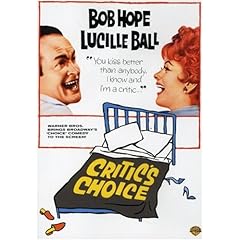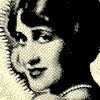
This movie has not one review that doesn't make a mention of
The Wizard of Oz or
March of the Wooden Soldiers. It's quite easy to.
The Wizard of Oz and
Jack and the Beanstalk are at first stuck in their worlds drained of color and interest. They melt into surrealist, colorful landscapes, barren of any sort of irony, presented matter-of-factly. They are so sure of themselves, any confusion upon watching seems to be a fault in the viewer even if the events truly don't make sense. This element of ordinary becoming more, of imaginative over real pervades in both, but Jack and the Beanstalk lacks the mythic element.
Wizard of Oz has the Everyperson who has dreamed of that Something more than playing out their life as expected, someone who has dreamed about beyond the possible and farther, asking what is beyond impossible: What is Somewhere over the Rainbow? Whereas Jack and the Beanstalk stars Costello, the innocently, adult comedian who we are so familiar with when he speaks those immortal words, "Who's on First?"...Not so grand.
And then when the story starts we want to compare this to Laurel and Hardy's masterpiece,
March of the Wooden Soldiers. Once again, elements are shared, such as the period costumes (those flamboyant leggings bring me back farther in childhood than I'd like to admit), the romantic pairing alongside the comedic, and plot points only a child can appreciate (or an adult who is willing to put aside pretensions). So why do we remember Laurel and Hardy's film but not Abbott and Costello's (or should I say Costello's-a point I will return to later)? I believe the answer lies in Laurel and Hardy's characters. They existed as children in adult bodies, living in a world which they could be in, but never understand. It makes sense to have them fight the bogeyman with their very bumblingness, as they had been fighting the creatures each time a film of theirs played, whether they be actual monsters in loincloths, their unforgiving wives or a Scotsman who reacts violently to buying Christmas trees. Abbott and Costello however, were two adults, two inept, immature adults who tripped each other up, but who still had desires and thoughts of men. They didn't exist in a world they couldn't understand, they understood but were so caught up in their own energies, practically bursting with it as anyone who has witnessed one of their arguments, that they couldn't see beyond the troubles they made for themselves. To see Abbott and Costello in period clothes, facing monsters, becomes laughable. They shouldn't be facing giants, they should be facing each other..."I don't know, that's what I'm asking you!"

So I've made every point on why you shouldn't enjoy this film. It pales compared to those two great children films, it's laughable and not in the good way but the way that makes your stomach turn as you become embarrassed for two shadows on the screen. A failed film. I would agree with all this, yet I can't stop myself from watching it, and not in horror, but in delight. I know every word to "In the Right".
Watch it and you'll see what I mean. Every other part leading up to this song has been painful to watch. The two romantic leads are leaden actors, the sets are cheap, and while Abbott gives a good, even inspired performance, seeing him breaks any suspension of belief. This is Bud Abbott from
Buck Privates, Hold that Ghost, Naughty Nineties, not a devious butcher from a land where giants roam. But when Costello is on the screen, alone on the screen, nothing but him and that cheap, cheap set, Something happens. The background becomes real in it's own way, plants
are made out of plastic, and the sky
is painted. Giants are an everyday occurrence and it's common sense to plant magic beans. And then you hear him sing that song. There is no trace of Costello but of Jack who believes so strongly in what he says, in what is around him, I did too. I believed that he was Jack who felled the giant, I believed that animals could talk, and yes, I believed that the wig Abbott wore was real.
There has only been a few times where I have watched a movie that made me believe so strongly in the imaginative. There have been many movies with childlike stories and sets, but there are few that actually believe what they show us. Today, turn on the television and see if you can find a kid's show that does not have some ironic edge. It's a show both children and adults can enjoy! But when it's done, did either of them believe in the magic?
There is not one ironic edge in
Jack and the Beanstalk and that can become ridiculous and a great failing at times, but it also becomes its strongest point. It's why I remember this movie fondly even when watching it became almost unbearable.
There are times when Costello throws himself so forcefully into the picture his feet slip out from under him and he falls in the most spectacular and terrible ways. But always with a smile. In the later part of his career rarely would you see such enthusiasm from the team as they were placed in increasingly sour products, but here it is so damn refreshing to see the two enjoy themselves. As the movie wore on, I found myself laughing without nervousness and with delight.
When the film closes, back in its sepia tone. We see Abbott and Costello as we would normally, their street clothes, drained of color, in this world. Abbott is himself, but Costello has changed. With his last few minutes of screen time we see this is no longer Costello the man but Costello the child who refused to leave once the body grew old. No, the need to assert himself became stronger as innocence was lost, the body aged, and a son died.
And for a few minutes, we can believe in that innocence.
Labels: Abbott and Costello, film, Laurel and Hardy, Wizard of Oz




